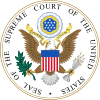| Kansas v. Marsh | |
|---|---|
 | |
| Argued December 7, 2005 Reargued April 25, 2006 Decided June 26, 2006 | |
| Full case name | Kansas v. Michael Lee Marsh, II |
| Docket no. | 04-1170 |
| Citations | 548 U.S. 163 (more) 126 S. Ct. 2516; 165 L. Ed. 2d 429 |
| Holding | |
| The Eighth Amendment did not prohibit states from imposing the death penalty when mitigating and aggravating sentencing factors were in equipoise. Kansas Supreme Court reversed and remanded. | |
| Court membership | |
| |
| Case opinions | |
| Majority | Thomas, joined by Roberts, Scalia, Kennedy, Alito |
| Concurrence | Scalia |
| Dissent | Stevens |
| Dissent | Souter, joined by Stevens, Ginsburg, Breyer |
| Laws applied | |
| U.S. Const. amend. VIII | |
Kansas v. Marsh, 548 U.S. 163 (2006), is a United States Supreme Court case in which the Court held that a Kansas death penalty statute was consistent with the United States Constitution. The statute in question provided for a death sentence when the aggravating factors and mitigating factors were of equal weight.[1]
See also
- List of United States Supreme Court decisions on capital punishment
References
- ^ The Supreme Court, 2005 Term — Leading Cases, 120 Harv. L. Rev. 144 (2006).
External links
- Text of Kansas v. Marsh, 548 U.S. 163 (2006) is available from: Findlaw Justia Oyez (oral argument audio)